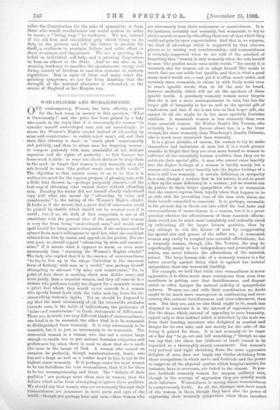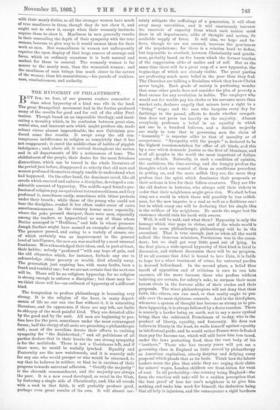WOMANLINESS AND WOMANISHNESS.
OUR contemporary, Woman, has been offering a prize for the best essay in answer to this question, What is Unwomanly P' and one prize has been gained by a lady who sends in the reply that it is unwomanly for woman "to consider herself undeveloped man and act accordingly : to storm the Women's Rights citadel instead of advancing by mine and countermine : to rudely reject man's aid, and then state that chivalry is dead : to touch pitch' unnecessarily and publicly, and then to abuse man for despising woman to compete jealously with man, unmindful of her delicate organism and the rights of posterity : to fret because her home-work is little : to wear too short skirts or to drag them in the mud : to forget that woman is only womanly when she sets herself to man 'like perfect music unto noble words.'" The objection to that answer seems to us to be that it is written too much for the express purpose of pleasing men, with a little hint thrown in,—perhaps purposely obscure,—of the best way of obtaining what women desire without offending men. Possibly the writer did not herself clearly understand very well what she meant by " advancing by mine and countermine" to the taking of the Women's Rights citadel. It looks as if she meant that a great deal of concession could be gained by stealth which should not be wrested even if it could ; but if so, the drift of that suggestion is not at all consistent with the general idea of the answer, that woman is very far from being "undeveloped man," and would only spoil herself for being man's companion, if she endeavoured to extract from man's willingness to spoil her, what she could not extract from him by reason and appeals to his justice. For our own part, we should regard "advancing by mine and counter- mine," if it means what it appears to mean, as even more unwomanly than "storming the Women's Rights citadel." The lady who replied that it is the essence of unwomanliness "to try to live up to the adage Imitation is the sincerest form of flattery,' with man as a model," was perhaps herself attempting to advance " by mine and countermine," for, in point of fact, there is nothing which men dislike more, and more justly, than a mannish woman, and they all concede to a woman who professes loudly her disgust for a mannish woman a great deal which they would never concede to a woman who openly found fault with the rules men lay down for cir- • eumseribing women's rights. Yet we should be disposed to say that the most unwomanly of all the womanlike attitudes towards men, is the habit of indirectness, the preference of "mine and countermine" to frank statements of differences. There are, in truth, two very different kinds of unwomanliness; one kind is to be mannish, the other kind is to be womanish as distinguished from womanly. It is very unwomanly to be mannish, but it is just as unwomanly to be womanish. The womanish woman is a woman who has not a nature large enough to enable her to put natural feminine otiquettes and preferences by, when there is need to show that she is made like man in the image of God. A woman who cannot on occasion be perfectly, though unostentatiously, frank, who has not a large as well as a tender heart in her, is not in the highest sense womanly. It is perhaps easier for most women to be too fastidious for true womanliness, than it is for them to be too uncompromising and blunt. The "defects of their qualities" are perhaps more often seen in women, than the defects which arise from attempting to ignore these qualities. We should say that women who are unwomanly through their womanishness are commoner in most parts and ages of the world,---though not perhaps here and now,—than women who
are unwomanly from their sexlessness or mannishness. It is
for instance, certainly not womanly, but womanish, to try to steal a march on men by wheedling them out of that which they could not gain by open expostulation. And that is, we suppose, the kind of advantage which is suggested by that obscure phrase as to 'mining and countermining ; and womanishness is certainly suggested when we are told of the mischief of forgetting that "woman is only womanly when she sets herself to man 'like perfect music unto noble words," for surely it is womanly also for woman not to adapt herself like music to words that are not noble but ignoble, and that is what a good many men's words are ;—and yet it is often much easier, and certainly more womanish, to chime in with lively music even to men's ignoble words, than to let the note be heard, however modestly, which will jar on the speakers of those ignoble words. A genuinely womanly woman never forgets that she is not a mere accompaniment to man, but has the larger gift of humanity in her as well as the special gift of tenderness, and that if she is not true to that larger gift, she cannot be all she might be in her more specially feminine relations. A womanish woman is less womanly than even some mannish women. Sir Walter Scott's Die Vernon, who certainly has a mannish flavour about her, is a far truer woman, far more womanly, than Thackeray's Amelia Osborne; who is much more womanish than womanly.
It is a great mistake, of course, for women to try to make themselves bad imitations of men, but it is a much greater mistake to forget that they are even more bound as women to cultivate all the essentially human qualities, than they are to cultivate their special gifts. A man who cannot enter heartily into the higher feelings of a woman is hardly manly, but a woman who cannot enter heartily into the higher feelings of a man is still less womanly. A certain deficiency in sympathy in a man, though a serious flaw in his nature, is not so great a flaw as the same deficiency in a woman; yet no woman can do justice to these larger sympathies who is so womanish
that sho cannot express them loyally when they happen to be
at odds with the prevailing tone of the men with whom she finds herself compelled to associate. It is, perhaps, excusable in the present day to throw out into relief the bad taste and unwomanliness of mannishness in a woman, but it is a great question whether the offensiveness of these mannish affecta- tions would not be much more completely and radically cured by cultivating all the larger human qualities, than by any attempt to win the favour of men by exaggerating the special airs and graces of the softer sex. A womanish woman may easily be tempted into mannish affectations; but a womanly woman, though, like Die Vernon, she may be superficially manly in her independence and promptitude of action, can never tolerate the affectations of the mannish school. The largo human side of a womanly woman is a far better security against doing what is against her natural sympathies, than any womanish timidity.
For example, we hold that while true womanliness is never aggressive, it is often much more courageous than even tree manliness in getting over that fastidiousness and disgust which so often hamper the natural activity of sympathetic natures. Women are, and with their constitution no doubt ought to be, much more courageous in confronting and over- coming this natural fastidiousness and over-refinement, than men. But they are, and we also think ought to be, much less disposed to overcome it in the interest of aggressive sports like the chase, which, instead of appealing to pure humanity, appeal only to that instinct which is inherited by the male sex from their hunting ancestors who delighted in combat and danger for its own sake, and not merely for the sake of the living it gained for them. It is not womanly to be eager on a fine day "to go out and kill something ;" though no one can say that the chase has (hitherto at least) ceased to be regarded as a thoroughly manly amusement. But woman's very natural and right shrinking from the more aggressive -delights of man, does not imply any similar shrinking from those occupations in which nerve and fortitude and the power to suppress all the physical qualms which hospital-nurses, for instance, have to overcome, are tested to the utmost. In pas- sive fortitude womanly women far surpass ordinary men, though in the courage of aggression they are usually much their inferiors. Womanliness is strong where womanishness is conspicuously.feeble. As all the stronger men have much of the woman in them, though they have also the power of repressing their womanly sympathies when these interfere
with their manly duties, so all the stronger women have much of true manliness in them, though they do not show it, and ought not to show it, except when their womanly instincts require them to show it. Manliness in men generally results in their concealing the depth of their sympathy with the true woman, because to give way to it would unman them for their work as men. But womanliness in women not unfrequently requires the open display of that large reserve of courage and force, which on ordinary occasions it is both natural and modest for them to conceal. The womanly woman is far nearer to the manly man, than the womanish woman ; and the manliness of man brings him much closer to the nature of the woman, than his mannishness,—his parade of reckless- ness, combativeness, and audacity.







































 Previous page
Previous page